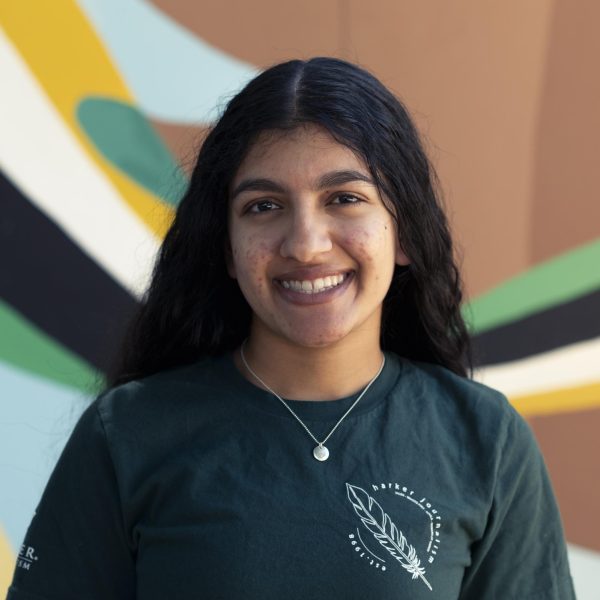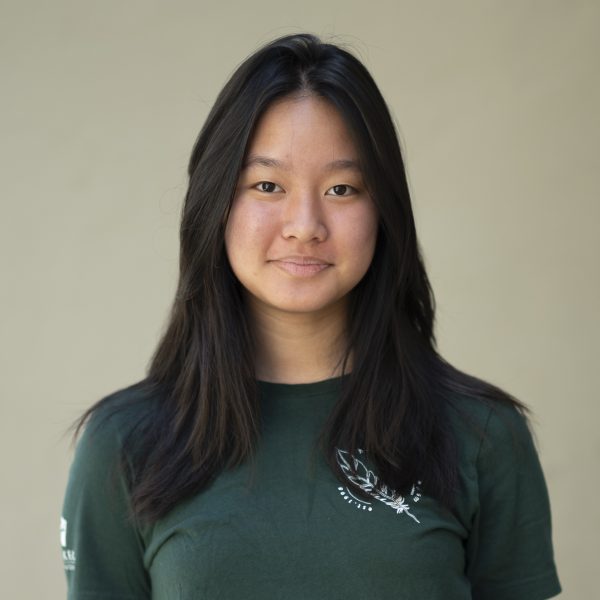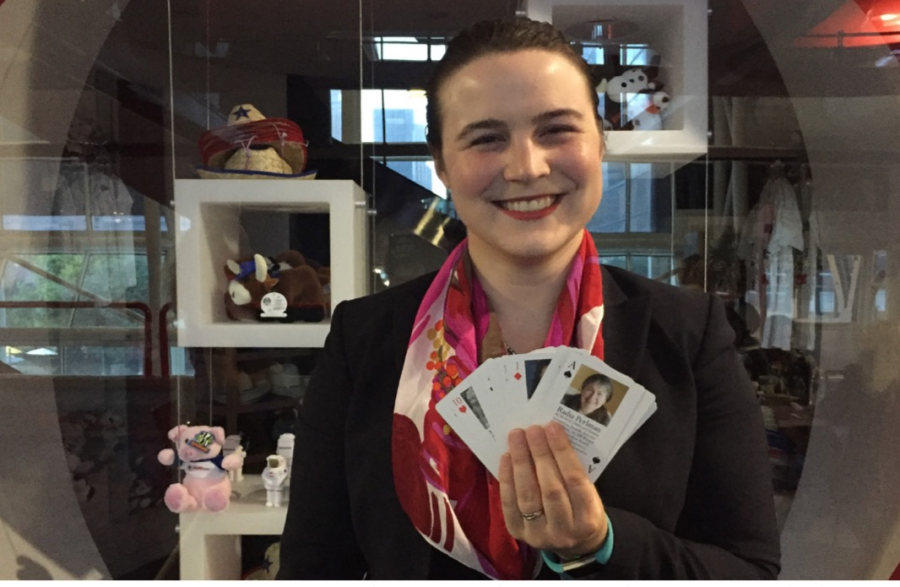Blooming from the STEM: Activist in tech
Jessica Dickinson Goodman (‘07) empowers and blends STEM, politics and human rights activism
Draw a venn diagram with three circles: policy, human rights and technology. What do these three fields have in common? Jessica Dickinson Goodman (‘07) stands at the center of these circles.
Dickinson Goodman graduated from Harker in 2007 after spending four years participating in the Junior Classical League (JCL), a place where she fostered her love for learning languages. Harker was the place where Dickinson Goodman discovered her love for human rights, one of the fields that have shaped her three-pronged career. She credits her Advanced Placement (AP) U.S. History teacher Ramsay Westgate for introducing her to the topic and encouraging further exploration into ethics-based material surrounding people’s rights outlined in laws.
“The first human rights issue I got interested in was human trafficking [because] my AP U.S. History teacher, Mr. Westgate, forwarded along to me the Trafficking in Persons Report from 2006, and the photography in that is just stunning,” Dickinson Goodman said. “The first 50 pages are just photos of trafficking situations all over the world, and then the rest of the report is a numerical analysis of what trafficking looks like in every country and territory and nation in the world.”
Spurred on by the injustices of human trafficking, Dickinson Goodman attended Carnegie Mellon University to pursue a major of ethics, history and public policy. She also participated in an exchange program in Qatar, where she continued to study International Policy while developing her STEM skills, studying data science and programming.
Dickinson Goodman went on to pursue a unique career path that blended policy, human rights and technology. Now, she incorporates her knowledge of each subject into her many positions: she has worked as a scheduler for Vice President Kamala Harris, run a website and campaigns at Harvard Law School for survivors of human trafficking, and is currently working as President of the Board of the San Francisco Bay Area Internet Society. Dickinson Goodman reflects on how working in all three fields has allowed her to continually challenge herself while working to empower others.
“I try to let serendipity make its own choices because you don’t have perfect control over where you end up in terms of your jobs and your careers, but building as many skills as you can and being as curious as you can is a lot of fun,” Dickinson Goodman said. “I tend to enjoy those three spaces because all three of them reward constant curiosity.”
Using her skills in technology and programming, Dickinson Goodman also volunteers as an Impact Coach for TechWomen, a U.S. government organization that supports women interested in STEM in the Middle East, Africa and Central and South Asia. Dickinson Goodman recalls her trip during a Gaza–Israel conflict in 2016, where she faced a difficult decision in deciding to travel to work there.

“All of us had to make this moral call,” Dickinson Goodman said. “Do I go to a place where I may be killed by U.S. made weapons, or do I stay home? The reason I went to Gaza in 2016 was because I couldn’t look my friend in the eyes and say that their daily reality is too scary for me to visit. For me, the ability to make those choices has a lot to do with the privileges I have as somebody who does work in STEM.”
During her time in Gaza, Dickinson Goodman worked with a group of women to raise money through Manara, “a social enterprise whose mission is to connect undiscovered talent in the Middle East and North Africa to global opportunities, diversifying the global tech sector and uplifting local economies.” For Dickinson Goodman, working in Gaza felt natural because of her fluency in Arabic and her familiarity with Palestine. She remembers how she was first drawn to the Middle East after the incident of 9/11.
“For my 12-year-old feminist heart, it seemed unacceptable to attack women because of how they dressed and because of their faith, and so for four weeks after 9/11, I wore a headscarf,” Dickinson Goodman said. “It was important to me at the time to make a public stance in support of Muslim women that they should not be attacked.”
Dickinson Goodman, who identifies as queer, also focuses her technology and policy knowledge on feminism and other corners of activism. Following the Supreme Court’s overthrow of Roe v. Wade with new decision Dobbs v. Jackson Women’s Health Organization, Dickinson Goodman began teaching data encryption and how to gain access to information about abortions and transgender healthcare as part of her role at San Francisco Bay Area Internet Society. Although the government has recently taken multiple steps to pass laws limiting such human rights, she found strength within her own belief and desire for equality in ethics and credits her careers for aiding her in the process.
“I had conversations with a number of people who were like: ‘Aren’t you teaching people to circumvent law enforcement?’” Dickinson Goodman said. “If I didn’t have the privilege and the knowledge of how policy works and how technology works, and the knowledge that the human rights issue was extremely clear for me, that could have been a really difficult conversation, but all of my confidence in that conversation came from being a queer person.”
Dickinson Goodman continues to fuel her work in human rights with her technical STEM training, fighting fearlessly to empower others. Driven by her love for her community and the world at large, she takes a stand not only for specific issues but whenever she sees a way to make a positive change, using her unique skillset to do so. Susan Nace, who directed Goodman in Cantilena and taught her in Study of Music, remembers her passion for bettering the people she cares about.
“She’s about community,” said Nace. “You think of people who are politically active as being people who may have a particular agenda. That’s not to say that Jessica doesn’t have certain things that she’s doing, but [she has] a love of the world and [a want for] things to be better, and whatever she does, it’s about making the world better.”

Sidak Sanghari (12) is an Editor-in-Chief of Humans of Harker, and this is her fourth year on staff. This year, she looks forward to honor the Class of...

Michelle Wei (12) is a co-managing editor for Humans of Harker, and this is her fourth year on staff. Through her writing, she hopes to explore topics...


















![“[Building nerf blasters] became this outlet of creativity for me that hasn't been matched by anything else. The process [of] making a build complete to your desire is such a painstakingly difficult process, but I've had to learn from [the skills needed from] soldering to proper painting. There's so many different options for everything, if you think about it, it exists. The best part is [that] if it doesn't exist, you can build it yourself," Ishaan Parate said.](https://harkeraquila.com/wp-content/uploads/2022/08/DSC_8149-900x604.jpg)




![“When I came into high school, I was ready to be a follower. But DECA was a game changer for me. It helped me overcome my fear of public speaking, and it's played such a major role in who I've become today. To be able to successfully lead a chapter of 150 students, an officer team and be one of the upperclassmen I once really admired is something I'm [really] proud of,” Anvitha Tummala ('21) said.](https://harkeraquila.com/wp-content/uploads/2021/07/Screen-Shot-2021-07-25-at-9.50.05-AM-900x594.png)







![“I think getting up in the morning and having a sense of purpose [is exciting]. I think without a certain amount of drive, life is kind of obsolete and mundane, and I think having that every single day is what makes each day unique and kind of makes life exciting,” Neymika Jain (12) said.](https://harkeraquila.com/wp-content/uploads/2017/06/Screen-Shot-2017-06-03-at-4.54.16-PM.png)








![“My slogan is ‘slow feet, don’t eat, and I’m hungry.’ You need to run fast to get where you are–you aren't going to get those championships if you aren't fast,” Angel Cervantes (12) said. “I want to do well in school on my tests and in track and win championships for my team. I live by that, [and] I can do that anywhere: in the classroom or on the field.”](https://harkeraquila.com/wp-content/uploads/2018/06/DSC5146-900x601.jpg)
![“[Volleyball has] taught me how to fall correctly, and another thing it taught is that you don’t have to be the best at something to be good at it. If you just hit the ball in a smart way, then it still scores points and you’re good at it. You could be a background player and still make a much bigger impact on the team than you would think,” Anya Gert (’20) said.](https://harkeraquila.com/wp-content/uploads/2020/06/AnnaGert_JinTuan_HoHPhotoEdited-600x900.jpeg)

![“I'm not nearly there yet, but [my confidence has] definitely been getting better since I was pretty shy and timid coming into Harker my freshman year. I know that there's a lot of people that are really confident in what they do, and I really admire them. Everyone's so driven and that has really pushed me to kind of try to find my own place in high school and be more confident,” Alyssa Huang (’20) said.](https://harkeraquila.com/wp-content/uploads/2020/06/AlyssaHuang_EmilyChen_HoHPhoto-900x749.jpeg)



